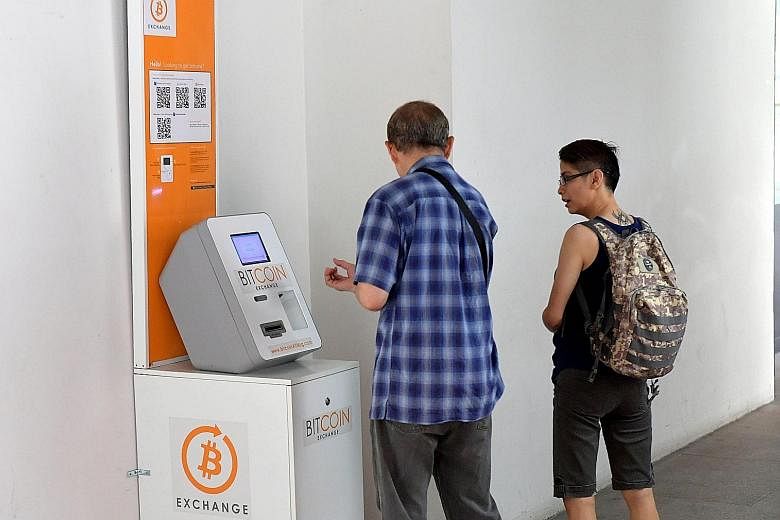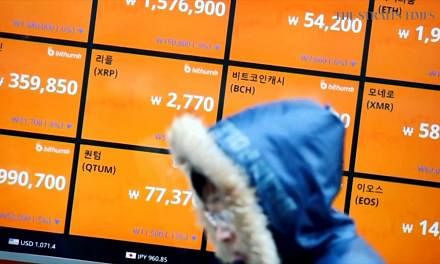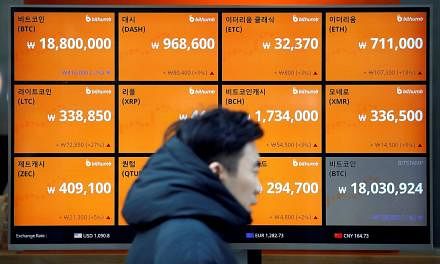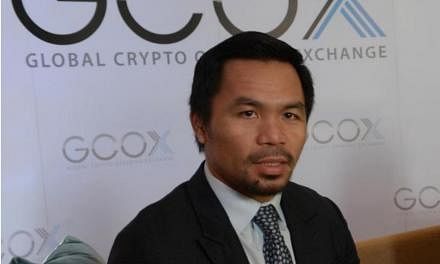The mania for bitcoin and other cryptocurrencies is generating no end of turmoil in financial markets and possibly setting up gullible investors for an almighty fall.
The Monetary Authority of Singapore (MAS) has issued two warnings about investing in these currencies in the past five months.
It is also concerned about what are known as initial coin offerings, when digital tokens are offered to investors in much the same way that shares are in a new listing.
The MAS noted last August that if a digital token constitutes a product regulated under Singapore securities laws, then any offer of digital currency must comply with the Securities and Futures Act and the Financial Advisers Act.
Exemptions may be granted if it is a small offer of securities, or if the offer is made only to institutional or accredited investors.
As the pace of initial coin (or token) offerings and other investments involving digital tokens gathers speed, here are some things you need to know .
For more information, visit the national financial education programme MoneySense website.
Q What are cryptocurrencies?
A Introduced about a decade ago, cryptocurrencies are a form of digital tokens that function as a medium of exchange, a unit of account or a store of value.
Unlike coins or notes, cryptocurrencies do not have a physical form. They are not issued by any government and are not legal tender. This means that consumers can use cryptocurrencies to pay for goods and services only if the merchant is willing to accept them as a mode of payment.
There are more than 1,300 cryptocurrencies worldwide, including bitcoin, ether and litecoin.
Cryptocurrency has become the fastest-growing segment of the financial world. Bitcoin prices reached a record high of nearly US$20,000 (S$26,600) last December before declining to about US$13,600.
These cryptocurrencies can be bought, sold or exchanged for real currencies through cryptocurrency intermediaries. Users of a virtual currency transact directly with each other, and each transaction is typically recorded in a blockchain.
"Cryptocurrencies use decentralised technology to let users make secure payments and store money without the need to use their name or go through a bank," aid Mr Syahrein Ritzwan from SG Mining.
"They run on a distributed public ledger called blockchain, which is a record of all transactions updated and held by currency holders."
You may buy, sell or transfer virtual currencies through an online platform or through dedicated self-service kiosks.
There are also apps that let you store your virtual currencies in a digital "wallet", and you may spend your virtual currencies at physical shops where they are accepted.
Q What is cryptocurrency mining?
A Mining is a computationally intensive process that computers comprising a cryptocurrency network complete to verify the transaction record, called the blockchain, and receive digital coins in return.
A mining rig is a computer system used for mining cryptocurrencies. The rig might be a dedicated miner set up specifically for mining or it could be a computer that fills other needs, such as performing as a gaming system, and is used to mine on a part-time basis.
A mining rig participates with other rigs (in a mining pool) to solve a block on the blockchain and gets rewarded, adds Mr Ritzwan.
Q Are cryptocurrencies regulated?
A Cryptocurrencies are not regulated by the MAS as they are not legal tender.
Note that MAS regulations also do not extend to the safety and soundness of cryptocurrency intermediaries or the proper functioning of cryptocurrency transactions.
As such, there is no regulatory safeguard for investments in cryptocurrencies. This means that if you lose money from investing in them, you will not be able to rely on any protection afforded under legislation administered by the MAS.
Q What are the risks?
A Most financial experts consider cryptocurrencies as highly speculative instruments. This is because they are not backed by any asset or issuer. The valuation of cryptocurrencies is not transparent and there is little information to help consumers gauge the fair value.
At the same time, the prices of cryptocurrencies are highly speculative and can fluctuate greatly within a short period of time.
There is a high risk of a sharp reduction in prices. In the worst-case scenario, the cryptocurrency could be rendered worthless, and investors run the risk of losing all their capital.
Q What is the potential misuse for unlawful activities?
A As cryptocurrency transactions are generally anonymous, it makes them vulnerable to being misused for unlawful activities, states MoneySense.
If a cryptocurrency intermediary is found to have used cryptocurrencies illegally, its operations could be shut down by law enforcement agencies. If you had transacted with such an intermediary, you could lose all your money.
You could also be exposed to greater risk of fraud and losses when transacting with cryptocurrency intermediaries. This is because most intermediaries do not have a presence in Singapore, so it is difficult to verify their authenticity or credibility. It would also be difficult to trace the platform's operators if it collapses.
Fraud has also occurred in relation to firms that claim to offer cryptocurrency payment platforms and other cryptocurrency-related products and services.
In December 2015, for example, the United States Securities and Exchange Commission charged two bitcoin mining firms with conducting a Ponzi scheme.
Cryptocurrency intermediaries may not have sufficiently robust security features, so consumers risk losing their money in a hack.
South Korean cryptocurrency exchange Youbit filed for bankruptcy last December after it was hacked for a second time. It was the first time a cryptocurrency exchange in the country has gone bankrupt.
Last Thursday, the South Korean government said it planned to ban cryptocurrency trading, as the authorities investigate local exchanges over alleged tax evasion.
What experts say
Mr Robson Lee, partner at Gibson, Dunn & Crutcher Llp

Investors of cryptocurrencies should be cognisant that the distributed ledger system does not provide any protection from hackers acquiring a user's private key. Once a hacker gains knowledge of your private key, the hacker has unbridled access to your cryptocurrency.
Cryptocurrency offerings are regarded as securities public offerings in many financial markets and are thereby constrained by prospectus compliance requirements.
The underlying cardinal risk that no cryptocurrency is legal tender in any financial market, including Singapore, should always be borne in mind. China has, in fact, shut exchanges for trading of cryptocurrencies and banned initial coin offerings. The South Korean Justice Ministry is preparing a Bill to outlaw cryptocurrency trading via exchanges.
Last but not least, the volatility in value of cryptocurrencies could adversely undermine their market acceptance as a sustainable store of value and investments. Cryptocurrencies are not intrinsically stable as they are not pegged to or backed by any legal currency.
Ms Reshmi Khurana, Managing Director at Global Corporate Investigator and Risk Consultant Kroll

Investors should know that the characteristics that make cryptocurrencies attractive - such as their 'democratic' nature because they are not controlled by any one central bank or government or economic trend and allow for seamless instantaneous transactions - are the same ones that are standing in the way of their scalability and sustainability, which is important for investors in the long run.
The infrastructure that supports these currencies is generated using complex mathematical formulas which even the most sophisticated investors may struggle to understand. Moreover, this network has never been breached or tested. And because these currencies are often open-source projects, it is unclear who is responsible for ensuring that the infrastructure is up to date and secure.
As the volume of transactions in cryptocurrencies increases, it will become clearer if these cryptocurrencies are secure and sustainable. On the other hand, as cryptocurrencies
become more 'mainstream', their attractiveness as an alternative to traditional currencies, which is their raison d'etre, will go down.
Bitcoins and other cryptocurrencies are here to stay. Investors should evaluate whether they can overcome the challenges described above to gain scale in their use around the world.
Ms Chung Shaw Bee, Head of Deposits and Wealth Management, Singapore and the Region, UOB

Investors' due diligence is all the more important when considering alternative investments where there is less familiarity and clarity.
Where virtual currency-related investment schemes are involved, there are a number of uncertainties that could confuse prospective investors. These include the technology which is the medium of the exchange of value, the real value of the virtual currency and the real value of the underlying assets.
The technology of and behind the virtual currency does not necessarily guarantee the substance, quality or even existence of the underlying assets of the investment. Neither does it provide for the certainty of returns. Prospective investors are advised to understand and to be clear about the structure and authenticity of the various components in such schemes.
In addition, retail investors should be certain that the investment matches their risk profile and appetite, and consider if they want to take the chance before parting with their money.
Mr Akshay Mehra, Chief Executive and Founder of Crowd Genie Financial Services

There are more than 1,300 cryptocurrencies, and this number is growing every month - so sifting through them can be a challenge.
My advice is to understand the business model of the company, and what makes a particular cryptocurrency different from another . Are they targeting a different market segment? Do they have some unique partnerships? Is the technology better, faster than say, bitcoin?
Most new companies will share their white papers that talk about their future plans and business model. Take the trouble to read through it; if it is unnecessarily technical, then that's a red flag.
Also, most will have chat groups on social media- these are good venues to see how others are reacting to the cryptocurrency.
Ultimately, evaluating which cryptocurrency to invest in is, in a lot of ways, similar to how one would evaluate investing in a new stock being listed. There will be some multi-baggers, but also a lot of duds - so invest with care!


















